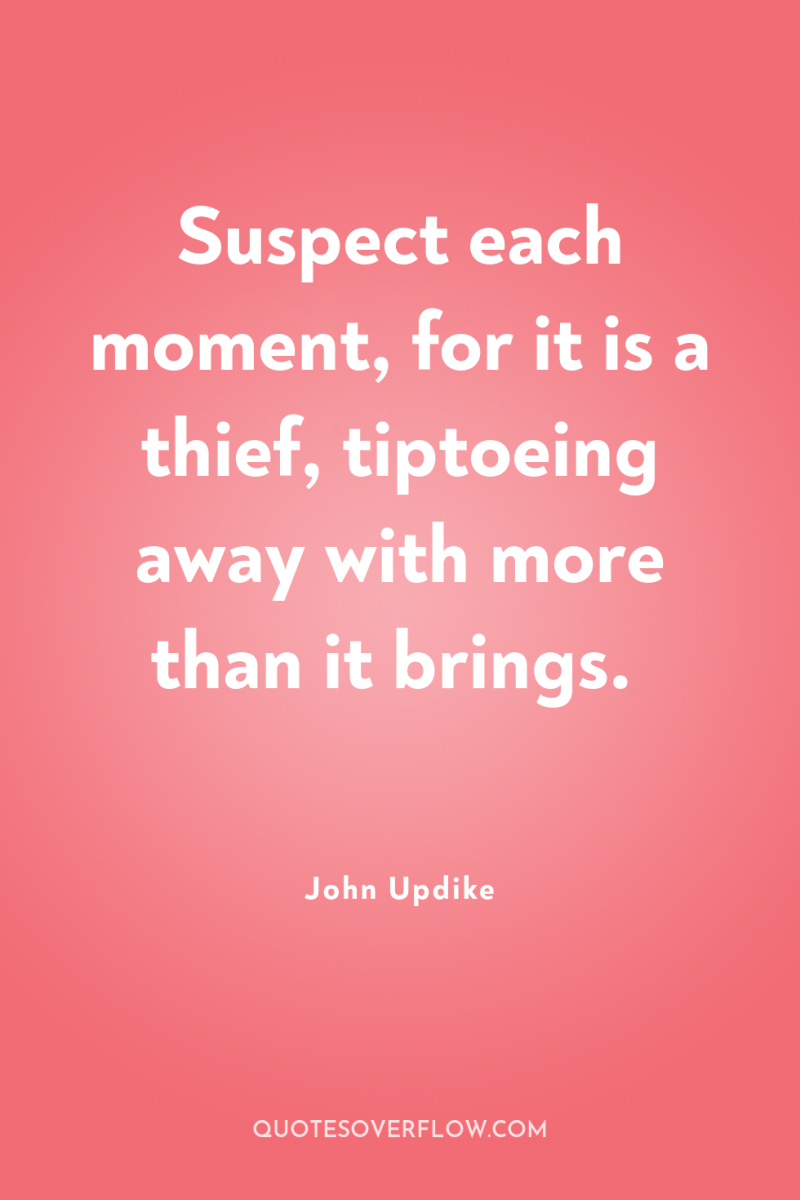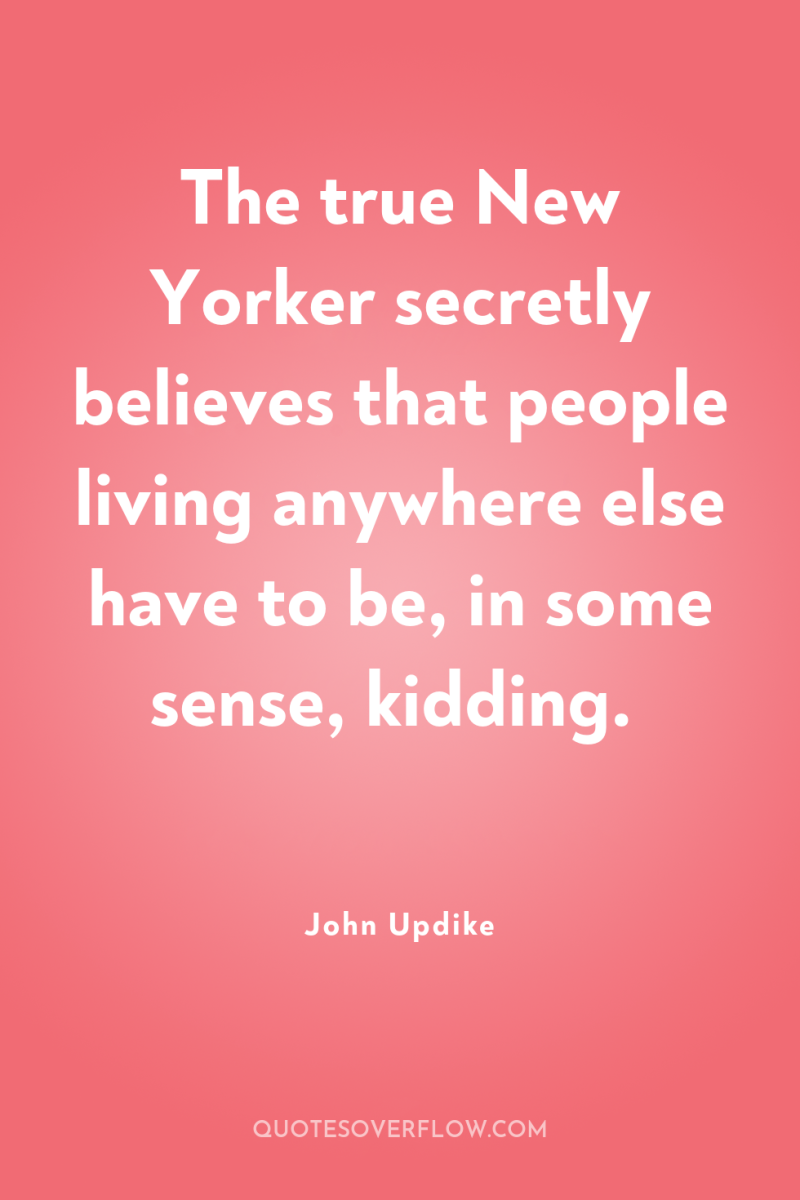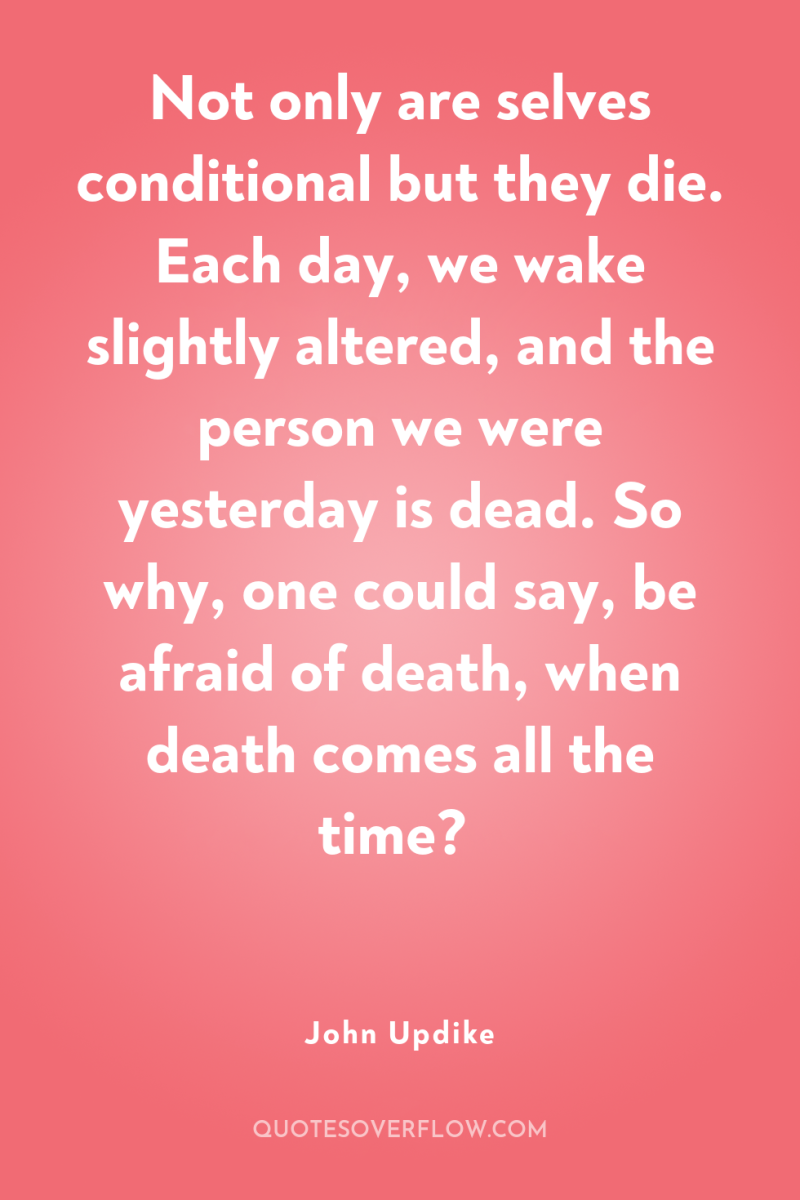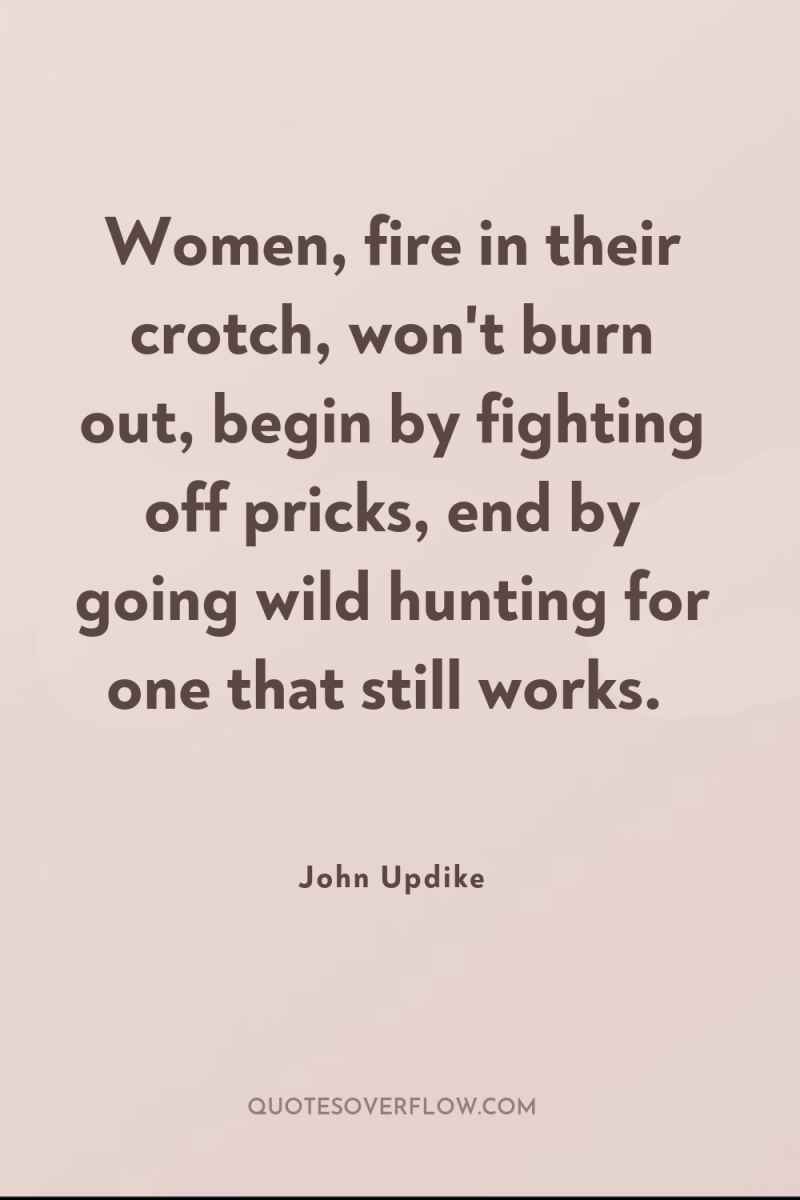
1
It is easy to love people in memory the hard thing is to love them when they are there in front of you.John Updike

2
Suspect each moment, for it is a thief, tiptoeing away with more than it brings.John Updike

3
If you have the guts to be yourself, other people'll pay your price.John Updike

4
The true New Yorker secretly believes that people living anywhere else have to be, in some sense, kidding.John Updike

5
Being able to write becomes a kind of shield, a way of hiding, a way of too instantly transforming pain into honey.John Updike

6
Not only are selves conditional but they die. Each day, we wake slightly altered, and the person we were yesterday is dead. So why, one could say, be afraid of death, when death comes all the time?John Updike
7
The thing about her is, she’s good-natured. He knew it the second he saw her standing by the parking meters. He could just tell from the soft way her belly looked. With women, you keep bumping against them, because they want different things, they’re a different race. Either they give, like a plant, or scrape, like a stone. In all the green world nothing feels as good as a woman’s good nature.John Updike

8
What art offers is space — a certain breathing room for the spirit.John Updike
![[I]n my own case at least I feel my professional...](https://cdn.quotesoverflow.com/file/quotesoverflow/images/in-my-own-case-at-least350458569655-1200.webp)
9
[I]n my own case at least I feel my professional need for freedom of speech and expression prejudices me toward a government whose constitution guarantees it.John Updike
10
To say that war is madness is like saying that sex is madness: true enough, from the standpoint of a stateless eunuch, but merely a provocative epigram for those who must make their arrangements in the world as given.John Updike
11
A morning later, Nancy described her first dream, the first remembered dream of her life. She and Judy Thorne were on a screened porch, catching ladybugs. Judy caught one with one spot on its back and showed it to Nancy. Nancy caught one with two spots and showed it to Judy. Then Judy caught one with three spots and Nancy one with four. Because (the child explained) the dots showed how old the ladybugs were. She told this dream to her mother, who had her repeat it to her father at breakfast. Piet was moved, beholding his daughter launched intoanother dimension of life. Like school. He was touched by her tiny stock of imagery the screened porch (neither they nor the Thornes had one; who?), the ladybugs (with turtles the most toylike of creatures), the mysterious power of numbers, that generates space and time. Piet saw down a long amplifying corridor of her dreams, and wanted to hear her tell them, to grow older with her, to shelter her forever.” John Updike, Couples, 1968.John Updike
12
The brontosaurus had thirty-ton body and a two-ounce brain. The anatosaurus had two thousand teeth. Triceratops had a helmet of filled bone seven feet long. Tyrannosaurus rex had tiny arms and teeth like six-inch razors and it was elected President. It ate everything–dead meat, living meat, old bones–John Updike

13
Women, fire in their crotch, won't burn out, begin by fighting off pricks, end by going wild hunting for one that still works.John Updike
14
Dollars had once gathered like autumn leaves on the wooden collection plates; dollars were the flourishing sign of God's specifically American favor, made manifest in the uncountable millions of Carnegie and Mellon and Henry Ford and Catholina Lambert. But amid this fabled plenty the whiff of damnation had cleared of dollars and cents the parched ground around Clarence Wilmot.John Updike
15
He lost his appetite for reading. He was afraid of being overwhelmed again. In mystery novels people died like dolls being discarded; in science fiction enormities of space and time conspired to crush the humans ; and even in P.G. Wodehouse he felt a hollowness, a turning away from reality that was implicitly bitter, and became explicit in the comic figures of futile parsons.John Updike
16
Who'll hold families together, if everybody has to live? Living is a compromise, between doing what you want and doing what other people want.John Updike
17
TV families and your own are hard to tell apart, except your isn't interrupted every six minutes by commercials and theirs don't get bogged down into nothingness, a state where nothing happens, no skit, no zany visitors, no outburst on the laugh track, nothing at all but boredom and a lost feeling, especially when you get up in the morning and the moon is still shining and men are making noisy bets on the first tee.John Updike
18
The mind cannot fall asleep as long as it watches itself. Only when the mind moves unwatched and becomes absorbed in images that tug it as it were to one side does self-consciousness dissolve and sleep with its healing, brilliantly detailed fictions pour in upon the jittery spirit. Falling asleep is a study in trust. Likewise, religion tries to put as ease with the world. Being human cannot be borne alone. We need other presences. We need soft night noises-a mother speaking downstairs. We need the little clicks and sighs of a sustaining otherness. We need the gods.John Updike
19
Writing … is an addiction, an illusory release, a presumptuous taming of reality, a way of expressing lightly the unbearable. That we age and leave behind this litter of dead, unrecoverable selves is both unbearable and the commonest thing in the world – it happens to everybody. In the morning light one can write breezily, without the slight acceleration of one’s pulse, about what one cannot contemplate in the dark without turning in panic to God. In the dark one truly feels that immense sliding, that turning of the vast earth into darkness and eternal cold, taking with it all the furniture and scenery, and the bright distractions and warm touches, of our lives. Even the barest earthly facts are unbearably heavy, weighted as they are with our personal death. Writing, in making the world light – in codifying, distorting, prettifying, verbalizing it – approaches blasphemy.John Updike
20
No act is so private it does not seek applause.John Updike
21
Children are not a zoo of entertainingly exotic creatures, but an array of mirrors in which the human predicament leaps out at us.John Updike
22
Having children is something we think we ought to do because our parents did it, but when it is over the children are just other members of the human race, rather disappointingly.John Updike
23
The fullness ends when we give Nature her ransom, when we make children for her. Then she is through with us, and we become, first inside, and then outside, junk. Flower stalks.John Updike
24
People go around mourning the death of God; it's the death of sssin that bothers me. Without ssin, people aren't people any more, they're just ssoul-less sheep.John Updike
25
Know Thyself, a wise old Greek once said. Know Thyself. Now what does this mean, boys and girls? It means, be what you are. Don't try to be Sally or Johnny or Fred next door; be yourself. God doesn't want a tree to be a waterfall, or a flower to be a stone. God gives to each one of us a special talent." Janice and Rabbit become unnaturally still; both are Christians. God's name makes them feel guilty. "God wants some of us to become scientists, some of us to become artists, some of us to become firemen and doctors and trapeze artists. And He gives to each of us the special talents to become these things, provided we work to develop them. We must work, boys and girls. So: Know Thyself. Learn to understand your talents, and then work to develop them. That's the way to be happy. .John Updike
26
My first thought, as a child, was that the artist brings something into the world that didn't exist before, and that he does it without destroying something else. A kind of refutation of the conservation of matter. That still seems to me its central magic, its core of joy.John Updike
27
The difficulty with humorists is that they will mix what they believe with what they don’t–whichever seems likelier to win an effect.John Updike
28
On the single strand of wire strung to bring our house electricity, grackles and starlings neatly punctuated an invisible sentence.John Updike
29
There is no doubt that I have lots of words inside me; but at moments, like rush-hour traffic at the mouth of a tunnel, they jam.John Updike
30
Lucas felt uncommonly depressed and careless. Drunkenness, in a man like August Hay, melts the restraints on cheerfulness. On the contrary with Lucas: he kept up courage consciously. Sap his mind, and the lid was lifted from a cesspool of muddy colors.John Updike
31
And yet does the appetite for new days ever really cease?John Updike
32
We must have sinned greatly, at some juncture long buried in our protozoic past, to deserve such a universeJohn Updike
33
Growth is betrayal.John Updike
34
No matter how cheerful and blameless the day’s activities have been, when you wake in the middle of the night there is guilt in the air, a gnawing feeling of everything being slightly off, wrong – you in the wrong, and the world too, as if darkness is a kind of light that shows us the depth we are about to fall into.John Updike
35
One does not go to Moscow to get fat.John Updike
36
Suddenly summoned to witness something great and horrendous, we keep fighting not to reduce it to our own smallness.John Updike
37
Chinese food in Texas is the best Chinese food in the United States except Boston.John Updike
38
What I'm going to do is pry every stinking tag off these f.ing chairs and make a f.ing collar and throw that cat right in Connor's puked-up face. Pale turd.John Updike
39
But it is just two lovers, holding hands and in a hurry to reach their car, their locked hands a starfish leaping through the dark.John Updike
40
She had willed herself open to him and knew that the chemistry of love was all within her, her doing. Even his power to wound her with neglect was a power she had created and granted ...John Updike
41
In the purifying sweep of atheism human beings lost all special value. The numb misery of the horse was matched by that of the farmer; the once-green ferny lives crushed into coal's fossiliferous strata were no more anonymous and obliterated than Clarence's own life would soon be, in a wink of earth's tremendous time. Without Biblical blessing the physical universe became sherry horrible and disgusting. All fleshy acts became vile, rather than merely some. The reality of men slaying lambs and cattle, fish and fowl to sustain their own bodies took on an aspect of grisly comedy--the blood-soaked selfishness of a cosmic mayhem.John Updike
42
I never heard enough damnation from your pulpit. Many mornings I had to strain to take hold of what you were saying, Reverend. I couldn't figure it out, and got dizzy listening, the way you were dodging here and there. A lot of talk about compassion for the less fortunate, I remember that. Never a healthy sign, to my way of thinking, too much fuss and feathers about the poor. They're with us always, the Lord Himself said. Wait till the next go-around, if the poor feel so sorry for themselves on this. The first shall be last. Take away damnation, in my opinion, a man might as well be an atheist. A God that can't damn a body to an eternal Hell can't lift a body up out of the grave either. .John Updike
43
He doesn't blame people for many sins, but he does hate uncoordination, the root of all evil, as he feels it, for without coordination there can be no order, no connecting.John Updike
44
Slim is queer and though Nelson isn't supposed to mind that he does. He also minds that there are a couple of slick blacks making it at the party and that one little white girl with that grayish kind of sharp-chinned Polack face from the south side of Brewer took off her shirt while dancing even though she has no tits to speak of and now sits in the kitchen with still bare tits getting herself sick on Southern Comfort and Pepsi. At these parties someone is always in the bathroom being sick or giving themselves a hit or a snort and Nelson minds this too. He doesn't mind any of it very much, he's just tired of being young. There's so much wasted energy to it.John Updike
45
I was made to feel I could do things. If you get this feeling early and can hold it until you're 15, you tend to never lose it.John Updike
46
Dabbling in the sandbox gives Rabbit a small headache. Over at the pavilion the rubber thump of Roofball and the click of checkers call to his memory, and the forgotten smell of that narrow plastic ribbon you braid bracelets and whistlechains out of and of glue and of the sweat on the handles on athletic equipment is blown down by a breeze laced with children's murmuring. He feels the truth: the thing that has left his life has left irrevocably; no search would recover it. No flight would reach it. It was here, beneath the town, in these smells and these voices, forever behind him. The fullness ends when we give Nature her ransom, when we make children for her. Then she is through with us, and we become, first inside, and then outside, junk. Flower stalks.John Updike
47
The voice welling up out of this little man is terrific, Harry had noticed it at the house, but here, in the nearly empty church, echoing off the walnut knobs and memorial plaques and high arched rafters, beneath the tall central window of Jesus taking off into the sky with a pack of pastel apostles for a launching pad, the timbre is doubled, richer, with a rounded sorrowful something Rabbit hadn't noticed hitherto, gathering and pressing the straggle of guests into a congregation, subduing any fear that this ceremony might be a farce. Laugh at ministers all you want, they have the words we need to hear, the ones the dead have spoken.John Updike
48
There is no such thing as static happiness. Happiness is a mixed thing, a thing compounded of sacrifices, and losses, and betrayals.John Updike
49
As long as Nelson was socked into baseball statistics or that guitar or even the rock records that threaded their sound through all the fibers of the house, his occupation of the room down the hall was no more uncomfortable than the persistence of Rabbit's own childhood in an annex of his brain; but when the stuff with hormones and girls and cars and beers began, Harry wanted out of fatherhood.John Updike
50
Driving is boring, " Rabbit pontificates, "but it's what we do. Most of American life is driving somewhere and then driving back wondering why the hell you went.John Updike
51
Momentarily drained of lust, he stares at the remembered contortions to which it has driven him. His life seems a sequence of grotesque poses assumed to no purpose, a magic dance empty of belief.John Updike
52
From infancy on, we are all spies; the shame is not this but that the secrets to be discovered are so paltry and few.John Updike
53
Perhaps we meet our heaven at the start and not the end of life.John Updike
54
Without warning, David was visited by an exact vision of death: a long hole in the ground, no wider than your body, down which you are drawn while the white faces above recede. You try to reach them but your arms are pinned. Shovels put dirt into your face. There you will be forever, in an upright position, blind and silent, and in time no one will remember you, and you will never be called by any angel. As strata of rock shift, your fingers elongate, and your teeth are distended sideways in a great underground grimace indistinguishable from a strip of chalk. And the earth tumbles on, and the sun expires, and unaltering darkness reigns where once there were stars.John Updike
55
The dead teach this great lesson, which we are loathe to learn: we too will die.John Updike
56
Chaos is God's body. Order is the Devil's chains.John Updike
57
While some of us burned on the edges of life, insatiable and straining to see more deeply in, he sat complacently at the centre and let life come to him – so much of it, evidently, that he could not keep track of his appointments.John Updike
58
The Chinese food arrives. Delicious saliva fills his mouth. He really hasn't had any since Texas. He loves this food that contains no disgusting proofs of slain animals, a bloody slab of cow haunch, a hen's sinewy skeleton; these ghosts have been minced and destroyed and painlessly merged with the shapes of insensate vegetables, plump green bodies that invite his appetite's innocent gusto. Candy.John Updike
59
They’ve not forgotten him: worse, they never heard of him.John Updike
60
Teddy was reminded of Paterson, but that polyglot population had appeared healthier, more hopeful, the American mood more fertile then in its promises, and the streets of Silk City with their little yards holding a fuchsia bush or a blue-robed plaster statue of the Virgin more livable than these stacked, stinking, ill-lit dens. He had been a part of the population then, a schoolboy immersed in its details of competition and expectation and childish collusion and hierarchy, alive in its struggle and too absorbed to judge or pity, whereas now he came upon it from outside, from above, as an agent of power and ownership, an enforcer and avenger, the representative of the system which squeezed the lowly by the same iron laws whereby it generation profits for the lucky and strong.John Updike
61
Oh, ' she says, 'the Vat prints nothing but rapes. You know what a rape usually is? It's a woman who changed her mind afterward.John Updike
62
Gutenberg (hesitantly): Perhaps the book, like God, is an idea some men will cling to. The revolution of print pursued a natural course. Like a river, print flowed to its readers, and the cheapness of the means permitted it, where the channel was narrow, to trickle. This electronic flood you describe has no banks; it massively delivers but what to whom? There is something intrinsically small about its content, compared to the genius of its working. And--if I may point out a technical problem--its product never achieves autonomy from its means of delivery. A book can lie unread for a century, and all it needs to come to life is to be scanned by a literate brain.John Updike
63
In fact we do not try to picture the afterlife, nor is it our selves in our nervous tics and optical flecks that we wish to perpetuate; it is the self as the window on the world that we can't bear to thinkof shutting. My mind when I was a boy of ten or eleven sent up its silent scream at the thought of future aeons -- at the thought of the cosmic party going on without me. The yearning for an afterlife is the opposite of selfish: it is love and praise of the world that we are privileged, in this complex interval of light, to witness and experience.John Updike
64
The faith in an afterlife, however much our reason ridicules it, very modestly extends our faith that each moment of our consciousness will be followed by another - that a coherent matrix has been prepared for this precious self of ours. The guarantee that our self enjoys an intended relation to the outer world is most, if not all, of what we ask from religion. God is the self projected onto reality by our natural and necessary optimism. He is the not-me personified. .John Updike
65
We are cruel enough without meaning to be.John Updike
66
The Englishman is under no constitutional obligation to believe that all men are created equal. The American agony is therefore scarcely intelligible like a saint's self-flagellation viewed by an atheist.John Updike
67
A healthy male adult bore consumes each year one and a half times his own weight in other people's patience.John Updike
68
One of the cool chaste countries - Canada or Sweden.John Updike
69
The difficulty with humourists is that they will mix what they believe with what they don't whichever seems likelier to win an effect.John Updike
70
We are most alive when we're in love.John Updike
71
Every marriage tends to consist of an aristocrat and a peasant of a teacher and a learner.John Updike
72
Mozart's music gives us permission to live.John Updike
73
Sex is like money only too much is enough.John Updike
74
Russia is the only country of the world you can be homesick for while you're still in it.John Updike
75
The scrape and snap of Keds on loose alley pebbles seems to catapult their voices high into the moist March air blue above the wires.John Updike
76
Professionalism in art has this difficulty: To be professional is to be dependable, to be dependable is to be predictable, and predictability is esthetically boring - an anti-virtue in a field where we hope to be astonished and startled and at some deep level refreshed.John Updike
77
Americans have been conditioned to respect newness, whatever it costs them.John Updike
78
To be a human being is to be in a state of tension between your appetites and your dreams, and the social realities around you and your obligations to your fellow man.John Updike
79
Dreams come true; without that possibility, nature would not incite us to have them.John Updike
80
Humor is my default mode.John Updike
81
The study of literature threatens to become a kind of paleontology of failure, and criticism a supercilious psychoanalysis of authors.John Updike
82
Golf appeals to the idiot in us and the child. Just how childlike golf players become is proven by their frequent inability to count past five.John Updike
83
What art offers is space - a certain breathing room for the spirit.John Updike
84
Inspiration arrives as a packet of material to be delivered.John Updike
85
Rain is grace; rain is the sky descending to the earth; without rain, there would be no life.John Updike
86
Every marriage tends to consist of an aristocrat and a peasant. Of a teacher and a learner.John Updike
87
We're past the age of heroes and hero kings... Most of our lives are basically mundane and dull, and it's up to the writer to find ways to make them interesting.John Updike
88
To guarantee the individual maximum freedom within a social frame of minimal laws ensures - if not happiness - its hopeful pursuit.John Updike
89
Each morning my characters greet me with misty faces willing, though chilled, to muster for another day's progress through the dazzling quicksand the marsh of blank paper.John Updike
90
The substance of fictional architecture is not bricks and mortar but evanescent consciousness.John Updike
91
The inner spaces that a good story lets us enter are the old apartments of religion.John Updike
92
The cinema has done more for my spiritual life than the church. My ideas of fame, success and beauty all originate from the big screen. Whereas Christian religion is retreating everywhere and losing more and more influence; film has filled the vacuum and supports us with myths and action-controlling images.John Updike
93
Religion enables us to ignore nothingness and get on with the jobs of life.John Updike
94
Existence itself does not feel horrible; it feels like an ecstasy, rather, which we have only to be still to experience.John Updike
95
A leader is one who, out of madness or goodness, volunteers to take upon himself the woe of the people. There are few men so foolish, hence the erratic quality of leadership in the world.John Updike
96
In fiction, imaginary people become realer to us than any named celebrity glimpsed in a series of rumored events, whose causes and subtler ramifications must remain in the dark. An invented figure like Anna Karenina or Emma Bovary emerges fully into the light of understanding, which brings with it identification, sympathy and pity.John Updike
97
That a marriage ends is less than ideal; but all things end under heaven, and if temporality is held to be invalidating, then nothing real succeeds.John Updike
98
The first breath of adultery is the freest; after it, constraints aping marriage develop.John Updike
99
Mars has long exerted a pull on the human imagination. The erratically moving red star in the sky was seen as sinister or violent by the ancients: The Greeks identified it with Ares, the god of war; the Babylonians named it after Nergal, god of the underworld. To the ancient Chinese, it was Ying-huo, the fire planet.John Updike
100
I know more about what it's like to be elderly and infirm and kind of stupid, the way you get forgetful, but on the other hand I'm a littler, wiser, dare we say? The word 'wisdom' has kind of faded out of our vocabulary, but yeah, I'm a little wiser.John Updike